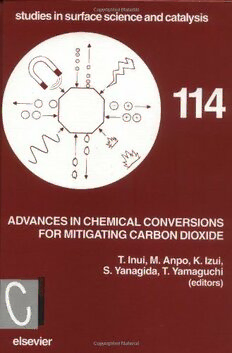Download Advances in Chemical Conversions for Mitigating Carbon Dioxide PDF Free - Full Version
Download Advances in Chemical Conversions for Mitigating Carbon Dioxide by T. Inui, M. Anpo, K. Izui, S. Yanagida, T. Yamaguchi in PDF format completely FREE. No registration required, no payment needed. Get instant access to this valuable resource on PDFdrive.to!
About Advances in Chemical Conversions for Mitigating Carbon Dioxide
Global environmental problems, especially global warming caused by the accelerative accumulation of carbon dioxide in the atmosphere, are of great importance for humans. The world's population is now approaching 6 billion, and is still increasing. Developments in communication systems and transportation tools have made the circulation of information, technologies and materials easier, which results in rapid economic growth, particularly in the East and Southeastern Asian countries. Increased affluence leads to an increased consumption of fossil fuels. Inevitably, this leads to an increase in carbon dioxide emission and environmentally hazardous materials which in turn precipitates climatic changes on a global scale. Recent studies showed that the increase in carbon dioxide emission for last year was the highest in the past seven years, and the total amount of carbon dioxide emission from all over the world reached 6.5 billion tons. Furthermore, one cannot overlook the report which appeared recently in Nature, that the floor-area of the iceberg in the South Pole has already decreased by 25% in the past five decades.Over 260 scientists and engineers from 21 countries who had a strong interest and wished to contribute to solve the carbon dioxide problem attended this conference. The papers presented in this volume cover most of the possibilities of the chemical conversion of carbon dioxide.
Detailed Information
| Author: | T. Inui, M. Anpo, K. Izui, S. Yanagida, T. Yamaguchi |
|---|---|
| Publication Year: | 1998 |
| ISBN: | 9780080526577 |
| Pages: | 721 |
| Language: | English |
| File Size: | 33.702 |
| Format: | |
| Price: | FREE |
Safe & Secure Download - No registration required
Why Choose PDFdrive for Your Free Advances in Chemical Conversions for Mitigating Carbon Dioxide Download?
- 100% Free: No hidden fees or subscriptions required for one book every day.
- No Registration: Immediate access is available without creating accounts for one book every day.
- Safe and Secure: Clean downloads without malware or viruses
- Multiple Formats: PDF, MOBI, Mpub,... optimized for all devices
- Educational Resource: Supporting knowledge sharing and learning
Frequently Asked Questions
Is it really free to download Advances in Chemical Conversions for Mitigating Carbon Dioxide PDF?
Yes, on https://PDFdrive.to you can download Advances in Chemical Conversions for Mitigating Carbon Dioxide by T. Inui, M. Anpo, K. Izui, S. Yanagida, T. Yamaguchi completely free. We don't require any payment, subscription, or registration to access this PDF file. For 3 books every day.
How can I read Advances in Chemical Conversions for Mitigating Carbon Dioxide on my mobile device?
After downloading Advances in Chemical Conversions for Mitigating Carbon Dioxide PDF, you can open it with any PDF reader app on your phone or tablet. We recommend using Adobe Acrobat Reader, Apple Books, or Google Play Books for the best reading experience.
Is this the full version of Advances in Chemical Conversions for Mitigating Carbon Dioxide?
Yes, this is the complete PDF version of Advances in Chemical Conversions for Mitigating Carbon Dioxide by T. Inui, M. Anpo, K. Izui, S. Yanagida, T. Yamaguchi. You will be able to read the entire content as in the printed version without missing any pages.
Is it legal to download Advances in Chemical Conversions for Mitigating Carbon Dioxide PDF for free?
https://PDFdrive.to provides links to free educational resources available online. We do not store any files on our servers. Please be aware of copyright laws in your country before downloading.
The materials shared are intended for research, educational, and personal use in accordance with fair use principles.

